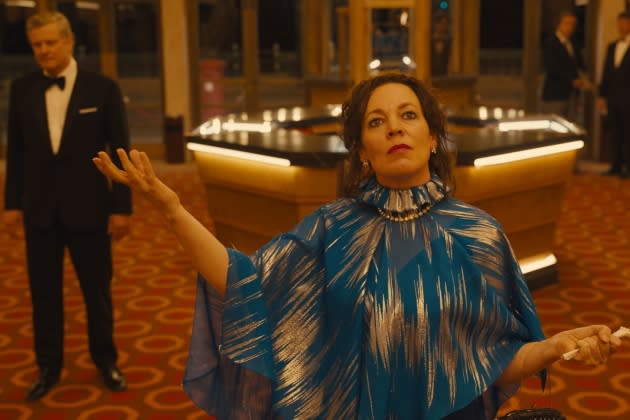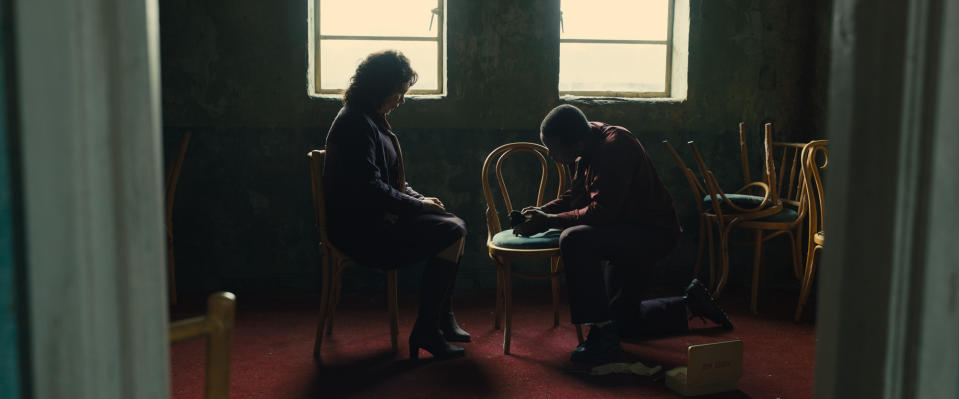‘Empire of Light’ Isn’t the Shining, Important Movie It Thinks It Is

Nostalgia. Romance. Mental illness. Racism. The magic of the movies. Sam Mendes’ Empire of Light contains all of these elements, each of them gently sidling next to — and occasionally colliding clumsily into — each other. Any one of these subjects would be enough on their own to power a movie, especially one dedicated to looking back at the early years Thatcher’s bulldog-eat-bulldog Britain with equal emphasis on the good, the bad, and the ugliness. Weave them together, and you could emerge with an Altmanesque tapestry piece that views a certain moment in time from a variety of angles. Or: you could end up making a movie that strives to be about every one of these things without actually being about any of them.
It is a truth universally acknowledged that any movie starring Olivia Colman can’t be all bad, of course, and Empire of Light wisely knows how to play the ace tucked snugly up its sleeve. The Oscar-winner is Hilary, the manager of a movie theater known as the Empire, located in the quaint English seaside town of Margate. She’s responsible for scheduling duties for the staff, taking the tickets, and working the concession stand; she’s also been co-opted into taking care of the sexual whims of her married boss (Colin Firth, leaning into the douchebaggery hard.) It’s tough to say what Hilary gets out of this workplace affair, although the drudging afternoon delights do seem to offer a respite from her loneliness. She’s congenial with everyone, but habitually eats dinner by herself. A medicine cabinet filled with prescription bottles suggests there’s more than just melancholia that’s causing her doldrums.
More from Rolling Stone
'The Staircase': The First Trailer for the True Crime Series Starring Colin Firth Drops
'To La Familia:' Watch Colin Firth Play Accused Killer Michael Peterson in 'The Staircase' Teaser
Watch Maggie Gyllenhaal Play 'Sweet Home Alabama' on Lap Steel on 'Fallon'
Then a new employee shows up, a young man named Stephen (Blue Story’s Micheal Ward) who displays a particular kindness to Hilary. She gives him a tour of the closed-off, dusty upper floors, which used to house a few extra theaters and a swank lounge until hard times forced the venue down to two screens. He shows her how to nurse a wounded pigeon using a customized sock as an ornithological body-bandage and introduces her to the joys of two-tone ska. For a while, Empire coasts on the charms of these two lovebirds-in-waiting and the camaraderie of their coworkers, which includes a chatty nerd (Tom Brooke), an eye-rolling Goth (Hannah Onslow) and a kindly old magical-geriatric projectionist played by Toby Jones, thus fulfilling the annual quota for films starring the ubiquitous character actor. (There are really only two types of roles now if you’re casting anyone from the United Kingdom that’s over the age of 40: Toby, or Not Toby.)

While Mendes is more than happy to give his actors a lovely showcase for their conversational banter, he’s also not staging a period-piece riff on Annie Baker’s Pulitzer-winning play The Flick. Melodrama is already hovering around the edges, in the form of taunting skinheads and hostile customers and enigmatic doctor visits. It’s hinted that Hilary has a history of instability, and that the introduction of a deeper connection with Stephen means she also may be off her meds. A day trip to the beach hints at greater, more pendulum-like mood swings to come, as well as the idea that an interracial relationship isn’t widely accepted in a place like this or an era like the early 1980s, when the National Front was stirring shit up.
Credit Mendes for not filtering Empire of Light’s inherent nostalgia through rose-colored glasses — though it’s still given the full prestige-drama treatment, courtesy of god-tier cinematographer Roger Deakins shooting shoreline exteriors like bright ‘n’ bleak landscape portfolios and the movie palace interiors like a cinephile’s version of heaven. Yet it’s not a coincidence that this story of love and celluloid is set during the early 1980s, either. At a Q&A at the Toronto International Film Festival this past September, Mendes mentioned that he would have been Stephen’s age when The Blues Brothers and All That Jazz were gracing screens at places like the Empire that he frequented. He also noted that his mother suffered from the same chemical imbalances as Hilary, although he considered this to merely be a personal film and not an autobiographical one.
Still, Empire of Light does feel designed to play like a memory piece, albeit one that only taps in to the maudlin aspects and leaves everything else the subgenre does well on the cutting room floor. The depictions of Hilary’s 100-klieg bursts of sunniness and outbursts of rage, her retreats into reclusiveness and fuzzy returns to “normal,” may be personal for Mendes (and Colman handles these scenes with sensitivity and commitment like the pro she is). Yet there’s something slightly distant about this time-travel trip, something disconnected — it’s the rare remember-when narrative that feels both way too sentimental and way, way too chilly at the same time. Even the movie love is muted. Yes, the slow death of places where people dream in the dark is symbolically powerful. But story-wise, Hilary and her fellow ticket jockeys could work anywhere. Her 11th-hour conversion to film nerddom, courtesy of Jones’ projectionist showing her Being There after hours, feels like an afterthought.
The racial aspects serve to remind viewers that the past is never really past, plus ça change, et al. Yet that too feels oddly obligatory, with the film playing up the animosity just for conflict and peeking into the home life of Stephen and his mother (Tanya Moodie) out of sheer courtesy. You never doubt the divisiveness of the times — you just don’t get deeper than headlines and clichés here. Colman’s performance keeps pushing things forward, offering glimpses of messy realities and genuine struggles, yet big-picture illuminating this is not. The sun sets on Empire of Light long before the movie itself fades out.
Best of Rolling Stone

